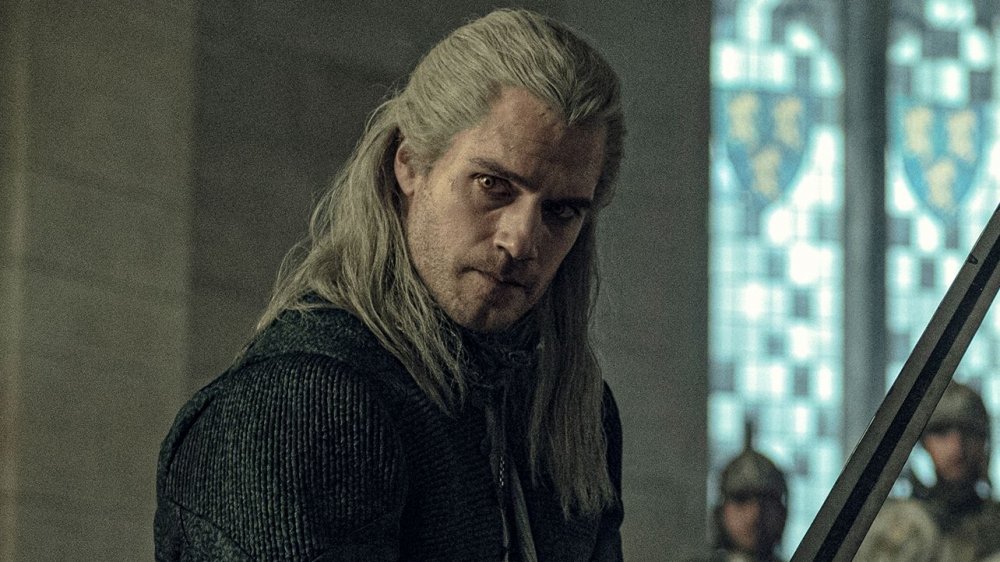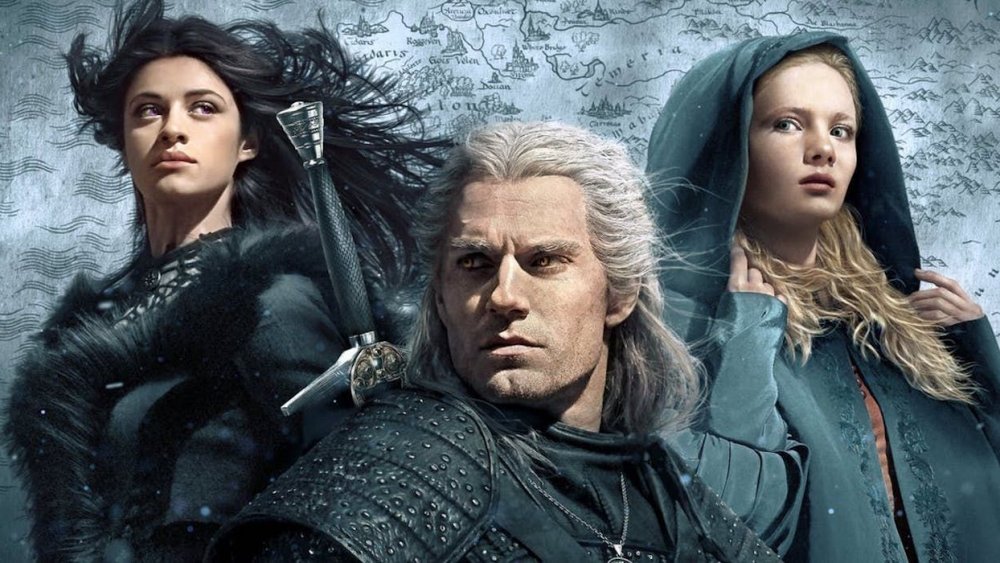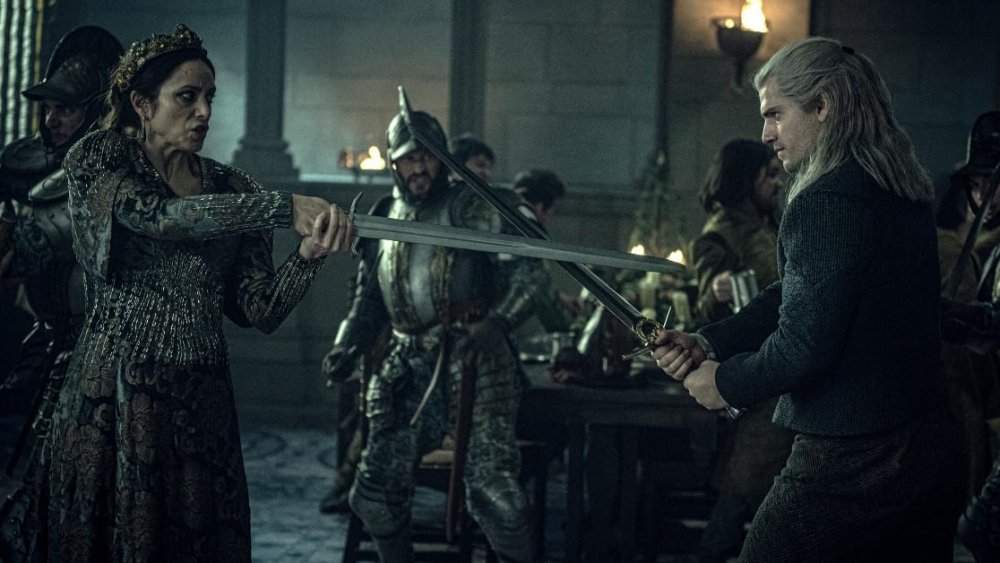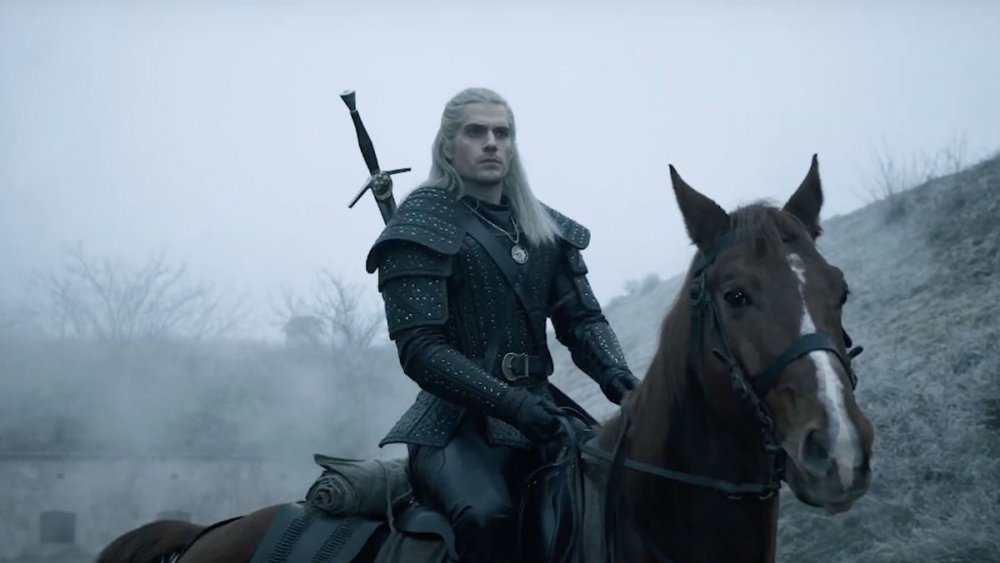The Real Reason The Witcher's First Season Has Only 8 Episodes
Netflix has finally unleashed its adaptation of The Witcher on the world, and in doing so, the streamer has pitted the absurdly large biceps of star Henry Cavill against all manner of foul beasts and even fouler people. Based on the novels and short stories by Andrzej Sapkowski, which inspired a popular video game series, The Witcher is seen by many as a scaled-back version of Game of Thrones, another book-to-TV adaptation nestled in the fantasy genre. However, it's proven itself a very different sort of beast — one who's success has ensured that a second season of The Witcher is already on the way.
Though The Witcher has been largely well-received, a common complaint about the first season is that it consisted of only eight episodes, each roughly an hour long. In fact, the series' relatively short inaugural season has become such a hot topic that one fan took advantage of a recent Reddit AMA event to ask The Witcher showrunner Lauren Schmidt Hissrich why season 1 has only eight episodes. According to Hissrich, there were a couple of major deciding factors for the episode count: "The number of episodes is based on the story we're telling, our sense of what an audience will watch (and finish), and the budget."
Story was a factor in The Witcher's episode count
If you've already completed your blood-soaked binge of Netflix's The Witcher, then you know Hissrich and crew delivered a lavish fantasy epic with story and spectacle to burn. More often than not, they actually manage to put story first. And to double back on Hissrich's original answer to the question of The Witcher's episode count, that's very much by design.
The showrunner expounded further on the concept later in her answer, detailing that the stories she and The Witcher producers wanted to tell within the Witcher-verse ultimately helped structure the overall narrative of the show's eight episodes. She explained, "What will work on television? For instance — no one wants to see Triss have diarrhea for three episodes. So what are we trying to glean from that in the books, and how do we present that onscreen?"
Surely, not many people would want to see Triss struggling with severe digestive issues for nearly half the season. So even if you're a little miffed by some of the changes made in Netflix's adaptation of The Witcher as compared to the video games, know that a lot of them were probably for the best. And they surely helped everyone involved focus the story into something that's unquestionably crafted in similar spirit as the books and games, even if the narrative arcs aren't exactly the same.
How budget restraints affected the episode count for The Witcher
It should come as little surprise that budget factored heavily into the production of The Witcher's first season. It is, after all, a fantasy series, which means it requires the sort of budget that can cover intricate costuming, lavish sets, complex special effects, and all the props and training required for action-packed set pieces. There's also the matter of paying onscreen talent, which comes into play in a big way when the star of your show is best known for portraying Superman.
Hissrich took matters a step further in her answer by reminding the inquisitive Redditer that — in spite of its popularity among fantasy readers and gamers — The Witcher was an unproven commodity in the live-action realm. As such, she and the show's producers knew they needed to be careful about how to best utilize The Witcher's budget until the show proved it had legs. In particular, it seems Hissrich and co. wanted to maximize the budget allotment of each individual episode, which is part of the reason why season 1 of The Witcher had just eight episodes.
"When you're starting a show, and don't know if it will be a success, more episodes generally means that you get to spend less money on every episode," explained Hissrich. "So we knew we didn't want to do that. Eight felt like the magic number."
How many episodes will The Witcher season 2 have?
As far as what The Witcher fans can expect in terms of episode count for the soon-to-shoot second season, Hissrich hinted in her response that eight episodes will probably remain the "magic number" for the series, at least for now. "We're approaching S2 in a similar way we did with S1," she said.
Then, Hissrich touched on how The Witcher team is approaching narratives for the upcoming season and beyond, revealing that they're constantly asking questions about the source material: "What are the stories Sapkowski was telling, and why? What building blocks do we need to set up future stories?"
Unfortunately, The Witcher's creative team is keeping those "future stories" on lockdown for the time being. But if you count yourself a fan of Andrzej Sapkowski's series of books and short stories or the beloved video games they've spawned, you know there's no shortage of wild tales for The Witcher's writers and producers to plunder. It's worth noting that the first season of The Witcher borrowed heavily from two of Sapkowski's short story collections – The Last Wish and Sword of Destiny, set prior to the central narrative of the series. They're also largely focused on the central characters of the Netflix series: the titular Witcher Geralt (Henry Cavill), the sorceress Yennefer (Anya Chalotra), and Princess Ciri (Freya Allan).
It seems the new season of The Witcher will continue to put those three characters front and center, with Cavill, Chalotra, and Allan all set to reprise their roles. Given that details about season 2 of The Witcher remain scarce, all we really know is that the second season is happening, it's nearing production, and will likely hit Netflix sometime in 2021. Here's hoping Hissrich and the rest of The Witcher team deliver another gritty dose of medieval madness with the new season.



